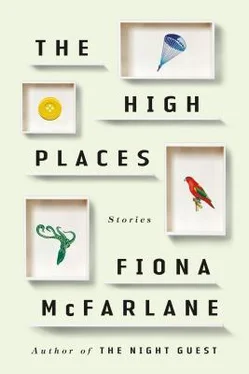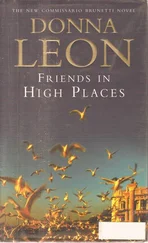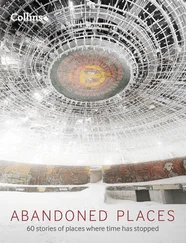After lunch with his mother, Henry went to see Kath. He lingered into the evening with Kath’s compact body. Later in the night, he read the newspapers by lamplight; Kath preferred lamplight. Henry had ambitious plans, but he considered anyone who worked too hard for his success a dupe; he read in the newspapers of the rigorous transactions of wealthy men and stabbed at these pages with a contemptuous finger. Kath yawned on the bed. She had the sort of long, streamlined face you sometimes see in tall women. She was more beautiful than Ellie, but less pretty. Kath was always making distinctions of that kind. She worked in the beauty salon of a flash hotel. Henry had met her at the hamburger place at Wynyard station; how odd and blazing and fine she had looked in that cheerful din.
He shook the newspaper and told her that this would be their final Sunday.
‘What’s her name?’ she asked.
‘Ellie,’ he said.
‘You like your girls with cute little names, don’t you,’ Kath said, and he considered this petty of her.
‘If you must know,’ Henry said, without looking at her face, ‘I’ve won the lottery.’
‘How much?’ she asked him, and when he told her, she sat up in bed and hooted like an owl.
‘You’re not serious,’ she said, swinging her long boyish legs over to rest her feet on the floor. ‘Let me pour you a drink, then, you bastard.’
She began an uncharacteristic sprightly chatter, telling him of every lucky instance in which a person she knew had won something: money, meat, flowers, jewellery and large appliances. Then she handed him a drink and said, ‘I thought you didn’t rate the lottery? I thought you didn’t even buy tickets?’
‘Just this once,’ he said, with a shrug of the papers, and she growled at him from the corner of her mouth and said, ‘No one’s that lucky.’
* * *
That Sunday night, a wind moved over the city. It rolled through in one direction, out of the sea and into the west, and it bent trees behind it. The wind brought rain at times, in orderly diagonal sheets, but there was no chaos to it, only consistency. On Monday morning, Henry stepped over fallen leaves and other storm litter on his way from Kath’s flat to the office. The wind rearranged his hair, so he combed it with his hand as he climbed the stairs. While climbing, he considered the fact that he liked his job, that he liked the idea of insurance, that it suited his temperate, ready mind. It occurred to him that he might not quit, even now that his mother had promised him the house. There was no need to make big gestures; after all, she couldn’t spare him such an enormous sum of money that it would do for two people, and children, for another sixty years. He sat at his desk and watched for Ellie all day, and whenever she was in sight he made sure she knew it. He mentioned the lottery win to one or two people. He told them that he knew he could rely on their discretion.
Ellie was waiting for him at the end of the day, wearing a funny little blue hat that hid most of her hair.
‘I wondered if you’d walk me to the Art Gallery,’ she said. ‘There’s a lecture tonight, and we could eat afterward.’ She laid one hand against his shoulder, in the same spot where she had rested her head on Friday, and although he was reluctant about the idea of a lecture and the Art Gallery, and about her having asked him before he could ask her, he said, ‘Let’s go, then.’ He took the elevator with her down to the lobby and Ellie leaned into his arm as if she couldn’t be near him without some sort of physical contact.
The wind was still about, and it funnelled through the streets and caught at Ellie’s skirt until they reached Hyde Park. Ellie stood for a moment beside the park’s great circular fountain and looked up at the figure at its centre.
‘Hi, Apollo,’ she said, and pointed. ‘I like to say hi whenever I pass. Isn’t he beautiful?’
The statue was naked, with one green bronze hand pointing toward the cathedral and the other holding some kind of harp. Henry supposed that this was art appreciation. He tried for a moment to replicate the position of Apollo’s knees.
‘He’s the god of poetry and music,’ Ellie said.
‘Do gods let birds do their business all over them?’ Henry asked, and Ellie laughed in just the right delighted way. ‘Come on,’ he said. ‘Or we’ll be late for your lecture.’ In this way, holding his hand out to her, chiding, pleased, he corrected the tone of the outing.
* * *
They were late, and Henry’s shoes squeaked on the marble floors of the gallery. There were chairs set up in the high, arched lobby, and a number of the people sitting in them turned to look. Henry thought the audience appeared well fed but somehow pinched. There were a number of fashionable hats. He saw a single vacant seat and urged Ellie into it; he stood at the back of the crowd with another young man.
‘Get dragged here too, did you?’ this man said, and Henry gave a mock grimace. They leaned together against a yellow wall in the easy company of their mutual conscription.
The lecturer was a man who described himself as a conceptual artist. Like Henry, he wore a light grey suit; in fact, he might have come, moments before, from an office like Henry’s, except that his hair was slightly longer than Henry would have allowed himself. He was talking about his latest work, which seemed to involve a photograph of a chair, an actual chair, and a card printed with the dictionary definition of a chair.
‘Bet it took him half an hour and a couple of beers to come up with that one,’ Henry said, in a low voice, to the man beside him.
‘You’re on,’ the man said. ‘A fiver.’ He shook the note out of his pocket like a magician producing a bird. But they only laughed, and the man put his money away.
Henry could see the back of Ellie’s head from where he stood, and he watched her listen. Her blue hat sat in her lap. The hat was for the wind, he realised, and he approved of her foresight. The artist coughed into the side of his mouth and said something about the impossibility of totality. Henry stirred with discomfort, the man beside him shifted too, and Ellie turned in her seat to look at them. She gave Henry a small sweet smile. When the artist called for questions, she slipped from her row, took Henry’s arm, and hurried him out into the night.
The Domain was dark under the fig trees and Ellie walked with her head resting against Henry’s arm. ‘Now we can eat,’ she said, as if the lecture had been a regrettable obstacle to this activity. The ground was soft underfoot with the ripe, wet leaves of the figs, and bats tittered in their intricate branches. He wasn’t sure where to take her to dinner, but she steered him toward a place off William Street that she said was Italian. There were brothels on the street and Ellie looked at their red lights with sad and serious eyes. American sailors, drunk and dressed in white, ran up out of Woolloomooloo. They called to Ellie as they passed and shook Henry’s hand. He was proud of her.
Over dinner he said, ‘What was all that about totality?’
And she answered, ‘Wasn’t he marvellous?’
Apparently he was, but there was no more to say about it. Ellie ordered expensive things, and Henry paid for them. She seemed somehow to have been his girl for a very long time. For example, she spoke of her friends and family as if he already knew them.
‘And Jimmy,’ she said, ‘is livid about Ann. But you can’t blame him.’ Or, ‘When we see her, you have to ask Mary about her surfing accident. It’s the funniest thing I ever heard.’
It was as if, with the new clarity of his mind, he had willed her into a relationship with him. She didn’t ask him any questions, but listened with her chin perched on the neat palm of one hand whenever he talked about himself. He told her about the money. He had been unsure whether to mention his mother or to claim the lottery win as his own, but was pleased to find himself telling the truth; it made him seem filial, respectful, the fortunate son of a lucky mother, and no dupe — he would never waste his daily bread on lottery tickets. Ellie listened, and watched him with her serious face. She was calculating, he thought, and he didn’t blame her. He wasn’t an unattractive man: there was his height and the vivid blue of his eyes, which Kath, in a mood, had once described as ‘hygienic’. But with his tall, loose frame he looked as if somebody had knitted him together, and his ears sat out too far from his head. There was nothing wrong with defects like these, as long as he knew about them. Ellie leaned across the table and took his hands in hers.
Читать дальше












